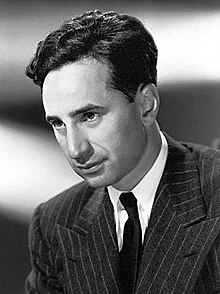
Back Elia Kazan AF إيليا كازان Arabic ايليا كازان ARZ Elia Kazan AST الیا کازان AZB Элія Казан BE Елия Казан Bulgarian এলিয়া কাজান Bengali/Bangla Elia Kazan Catalan ئیلیا کازان CKB
Elia Kazan | |
|---|---|
| Ηλίας Καζαντζόγλου | |
 Kazan c. 1950 | |
| Born | Elias Kazantzoglou September 7, 1909 Constantinople, Ottoman Empire (now Istanbul, Turkey) |
| Died | September 28, 2003 (aged 94) Manhattan, New York City, US |
| Nationality | American |
| Education | |
| Occupations |
|
| Years active | 1934–1976 |
| Spouses | |
| Children | 5, including Nicholas |
| Relatives |
|
| Signature | |
Elias Kazantzoglou (Greek: Ηλίας Καζαντζόγλου, IPA: [iˈli.as kazanˈdzoɣlu]; September 7, 1909 – September 28, 2003), known as Elia Kazan (/ˈiːliə kəˈzæn/ EE-lee-ə kə-ZAN),[1][2][a] was an American film and theatre director, producer, screenwriter and actor, described by The New York Times as "one of the most honored and influential directors in Broadway and Hollywood history".[4]
Born in Constantinople (now Istanbul) to Cappadocian Greek parents, his family came to the United States in 1913. After attending Williams College and then the Yale School of Drama, he acted professionally for eight years, later joining the Group Theatre in 1932, and co-founded the Actors Studio in 1947. With Robert Lewis and Cheryl Crawford, his actors' studio introduced "Method Acting" under the direction of Lee Strasberg. Kazan acted in a few films, including City for Conquest (1940).[5]
His films were concerned with personal or social issues of special concern to him. Kazan writes, "I don't move unless I have some empathy with the basic theme."[6] His first such "issue" film was Gentleman's Agreement (1947), with Gregory Peck, which dealt with antisemitism in the United States. It received eight Oscar nominations and three wins, including Kazan's first for Best Director. It was followed by Pinky (1949), one of the first films in mainstream Hollywood to address racial prejudice against African Americans. A Streetcar Named Desire (1951), an adaptation of the stage play which he had also directed, received twelve Oscar nominations, winning four, and was Marlon Brando's breakthrough role. Three years later, he directed Brando again in On the Waterfront, a film about union corruption on the New York harbor waterfront. It also received twelve Oscar nominations, winning eight. In 1955, he directed John Steinbeck's East of Eden, starring James Dean.
A turning point in Kazan's career came with his testimony as a "friendly witness" before the House Un-American Activities Committee (HUAC) in 1952 at the height of the Hollywood blacklist. His decision to cooperate and name names brought him strong negative reactions from many friends and associates. His harshly anti-communist testimony "damaged if not shattered the careers of his former colleagues, Morris Carnovsky and Art Smith, both actors, and the playwright Clifford Odets".[7] In his memoirs, Kazan writes that he and Odets had made a pact at the time to name each other in front of the committee.[8] Kazan later justified his actions by saying he took "only the more tolerable of two alternatives that were either way painful and wrong".[9] Nearly a half-century later, his 1952 HUAC testimony continued to cause controversy. When Kazan was awarded an honorary Oscar in 1999, dozens of actors chose not to applaud as 250 demonstrators picketed the event.[10]
Kazan influenced the films of the 1950s and 1960s with his provocative, issue-driven subjects. Director Stanley Kubrick called him "without question, the best director we have in America, [and] capable of performing miracles with the actors he uses".[11]: 36 [12] Film author Ian Freer concludes that even "if his achievements are tainted by political controversy, the debt Hollywood—and actors everywhere—owes him is enormous".[13] Orson Welles said "Kazan is a traitor ... [but] he is a very good director".[14] In 2010, Martin Scorsese co-directed the documentary film A Letter to Elia as a personal tribute to Kazan.[15][16]
- ^ Dictionary.com – Kazan
- ^ Oxford Learners' Dictionary – Elia Kazan
- ^ "Ελία Καζάν, 28 Σεπτεμβρίου 2003". ert.gr (in Greek). September 28, 2023.
- ^ Cite error: The named reference
Rothsteinwas invoked but never defined (see the help page). - ^ "Robert Osborne on Method Acting". TCM. Retrieved October 3, 2017.
- ^ Cite error: The named reference
Stevenswas invoked but never defined (see the help page). - ^ Weinraub, Bernard (January 16, 1997). "A McCarthy Era Memory That Can Still Chill". The New York Times.
- ^ Kazan 1988, pp. 462–463.
- ^ "Scorsese gets personal in his A Letter to Elia" Gulf News, September 6, 2010.
- ^ Weinraub, Bernard (March 22, 1999). "Amid Protests Elia Kazan Receives His Oscar". The New York Times. Archived from the original on April 11, 2010. Retrieved March 20, 2020.
- ^ Ciment, Michel. Kubrick: The Definitive Edition, Faber and Faber, Inc. (1980; 1999).
- ^ International Dictionary of Films and Filmmakers – 2: Directors, St. James Press (1997) pp. 519–522.
- ^ Freer, Ian. Movie Makers: 50 Iconic Directors, Quercus Publishing (London) (2009) pp. 84–85.
- ^ Warburton, Michael (January 25, 2023). "When Orson Welles Denounced Elia Kazan as a Traitor for Giving Other Filmmakers' Names to Joe McCarthy (1982)". Open Culture.
- ^ "Scorsese Film Defends Anti-Communist Informer Kazan" ABC News, September 4, 2010.
- ^ "A Letter to Elia" Variety, September 4, 2010.
Cite error: There are <ref group=lower-alpha> tags or {{efn}} templates on this page, but the references will not show without a {{reflist|group=lower-alpha}} template or {{notelist}} template (see the help page).